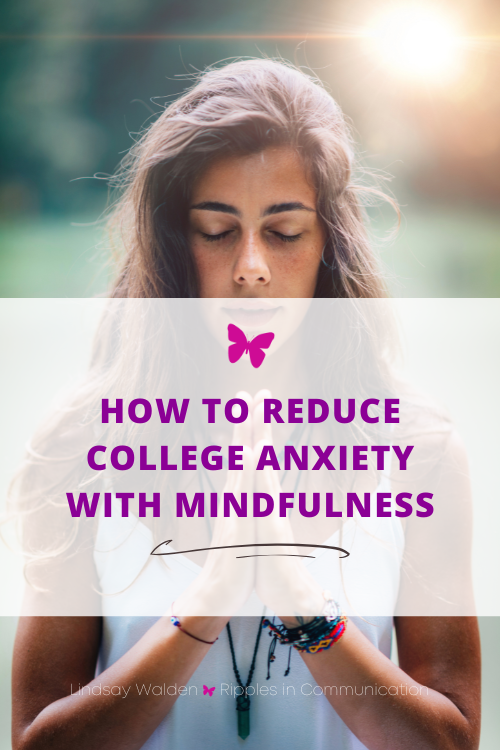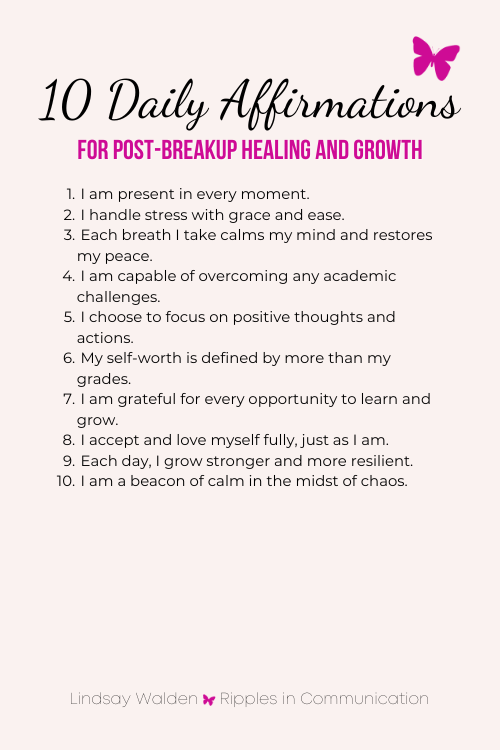How to Practice Mindfulness as a College Student
College life is a vibrant mix of challenges and triumphs, pushing students to the brink of their capabilities while offering unprecedented opportunities for growth. Balancing academic rigor with personal development isn't just about surviving; it's about thriving in an environment that tests every aspect of your resilience. In this blog post, we'll explore how mindfulness can be a game-changer for students struggling to find their footing amid the chaos of college pressures.
College life is often synonymous with academic pressures, late night study sessions, steep deadlines as well as the pursuit of fun and enjoyment. For many students, this high-pressure environment can lead to higher levels of stress which can lead to a diminished sense of self-worth.
I have worked with countless college students over the years, and mindfulness practices can be such an incredibly powerful tool to navigate these challenges faced during college years.
Have you gotten my FREE Relationship Communication Guide yet? Start building an authentic, conscious, and thriving relationship with your partner TODAY. Say goodbye to misunderstandings, conflicts, and missed opportunities for a deeper connection. These are the same tips and practical advice I give to my clients every day. With this guide, you'll be equipped to navigate any communication challenge and build a strong and fulfilling bond with your partner. Click the button below to enter your email address and I will send the guide to your inbox right away!
The Burden of Academic Expectations
The journey begins with recognizing the toll that intense academic demands can take on mental health. For many students like Rachel, college isn't just a series of classes; it's a relentless pursuit of excellence that can lead to overwhelming stress. This stress, if left unchecked, manifests in both physical and psychological symptoms, hindering performance and well-being. Rachel's story highlights the critical need for proactive measures to address these pressures head-on.
I first met Rachel during winter break of her sophomore year. She was double majoring in biology and chemistry and after only a year and a half of college, she was afraid she wouldn’t be able to achieve the success she so desired.
Rachel often found herself overwhelmed by the demands of balancing her coursework, her sorority responsibilities, her part time job, trying to make time for her boyfriend and the pressure to maintain high grades.
All this stress took a toll on her mental health and her self-esteem was really suffering.
Discover the transformative power of mindfulness with these 5 essential steps tailored for college students. Enhance focus, reduce stress, and find peace amidst academic pressures. Perfect for students looking to balance their studies with personal growth.
Transforming Stress with Mindfulness
Turning to mindfulness, students can discover a powerful tool for managing their educational journey. This section of the blog delves into the specifics of how mindfulness techniques, such as deep breathing exercises, mindful study habits, and body scan meditations, can dramatically alter the college experience. These practices don't just mitigate stress; they transform the approach to learning and personal development, fostering a sense of presence and calm in the midst of academic storms.
Rachel's struggle with academic pressure started to become evident as she navigated her freshman year of college. She began to recognize signs of stress—frequent headaches, trouble sleeping, unsettling dreams, and a pervasive anxiety about her daily tasks. This constant state of stress was exacerbated by her self-worth being deeply tied to her academic performance, which sapped the joy from her successes and made her accomplishments feel less satisfying, particularly as she struggled to meet her own expectations.
Realizing the harmful impact of this unrelenting pressure, Rachel knew she needed to initiate change. Though she initially thought she needed to overhaul her entire lifestyle, it became clear that what she really needed was targeted help. She sought to find effective ways to manage her stress, improve her overall well-being, and cultivate a healthier relationship with her academic studies and herself. This acknowledgment marked a pivotal point in her journey towards developing sustainable coping strategies that could bring balance and wellness back into her life.
The next step was so simple to implement but the rewards had the potential of being so great and impactful not only for her course work, but for her personal life and mental health. We talked about ways that she could start using mindfulness practices to help recenter herself anytime the overwhelm started taking over! Here are the 5 mindfulness practices Rachel decided to take on and the results of her dedication and practice.
5 Steps to Embracing Mindfulness Practices as a College Student
Learn About Mindfulness - Rachel started by learning about mindfulness and its benefits. She discovered that mindfulness involves being fully present in the moment, observing thoughts and feelings without judgment. This practice can reduce stress, enhance focus, and promote self-compassion.
Incorporate Mindful Breathing - One of the first mindfulness practices Rachel adopted was mindful breathing. She set aside a few minutes each day to focus on her breath, inhaling deeply and exhaling slowly. This simple practice helped her calm her mind, reduce anxiety, and stay grounded amidst the chaos of college life. There are some variations on the mindful breathing activity. You can inhale for two seconds, hold for two seconds, exhale for two seconds, hold for two seconds. You could also take one very deep breath in, and then expel all of the air as quickly as possible in one swooshing breath!
Mindful Study Sessions - Rachel integrated mindfulness into her study sessions. Before starting her work, she took a few moments to center herself with deep breaths. You don’t have to do a lot of breathing to center yourself. Just a few repetitions of one of the activities mentioned and step two could really help get you on the right path! During study sessions, she practiced staying present with the material, gently redirecting her focus when her mind wandered. It’s very common for people to mentally beat themselves up when they notice that their mind has wandered. This approach improved her concentration and made her study time more effective and enjoyable.
Body Scan Meditation - After a few sessions Rachel incorporated body scan meditation into her routine to release physical tension. Lying down or sitting comfortably, she directed her attention to different parts of her body, noticing any sensations without judgment. This practice helped her relax and become more aware of how stress affected her body. You may not notice a lot the first few times you try this. Learning how to connect your mind, thoughts, and feelings to your body takes practice. Give yourself some grace as you learn this new process.
Gratitude Journaling - To cultivate self-worth, self-love and self-acceptance, Rachel began keeping a gratitude journal. Each day, she wrote down three things she was grateful for, focusing on positive aspects of her life and achievements. This practice shifted her perspective from self-criticism to appreciation and self-compassion. Of course it takes time to shift from those more critical thoughts to the more compassionate ones, just spending a few minutes a day practicing gratitude can be immensely helpful for your brain, as well as your overall well-being!
Combat college anxiety effectively with mindfulness techniques. Learn simple and actionable ways to calm your mind and enhance your academic performance.
The Results of Practicing Mindfulness
Rachel's journey with mindfulness practices brought about a significant transformation in her life, markedly reducing her stress and anxiety. By focusing on the present moment and releasing judgmental thoughts, she achieved a newfound calm and clarity. This mental shift proved invaluable in effectively navigating her academic challenges, allowing her to approach her studies with a clearer mind.
Her new mindful approach also enhanced her focus and productivity. Rachel found herself less bogged down by procrastination and more actively engaged with her coursework. This change not only increased her understanding but also improved her retention of material, making her study sessions more efficient and rewarding.
Incorporating gratitude journaling and mindful self-compassion into her routine, Rachel developed a stronger sense of self-love and acceptance. This practice enabled her to celebrate her academic and personal achievements with greater kindness towards herself, fostering an internal environment of appreciation rather than criticism.
Additionally, Rachel's physical well-being improved alongside her mental health. Techniques like body scan meditation and mindful breathing helped enhance her sleep quality and reduce physical stress symptoms, such as headaches. These improvements left her feeling more energized and refreshed each day.
Ultimately, mindfulness led Rachel to a more balanced and fulfilling college experience. She became more attuned to her passions, enjoyed her activities more thoroughly, and fostered healthier relationships with her studies and herself. This holistic enhancement of her college life exemplifies the profound impact mindfulness can have on personal development and academic success.
Reaping the Rewards of a Mindful College Life
The impact of these mindfulness practices on Rachel's college life was profound. Reduced stress levels, enhanced focus during study sessions, and a newfound appreciation for her own efforts led to significant improvements in her academic and personal life. The benefits extended beyond academics; Rachel enjoyed better sleep, fewer stress-related physical symptoms, and an overall richer, more balanced college experience.
By embracing mindfulness, students like Rachel not only survive but thrive in college, turning potential burnout into opportunities for growth, self-discovery, and fulfillment. College students face a myriad of challenges. With the 5 steps to practicing mindfulness while in college, students can learn to navigate these challenges, transforming potential struggles into stories of success and self-improvement.
Empower your college journey with these 10 powerful daily affirmations designed to enhance mindfulness and reduce stress. Perfect for students looking to maintain balance and focus amidst academic pressures. Start your day feeling motivated and centered!







